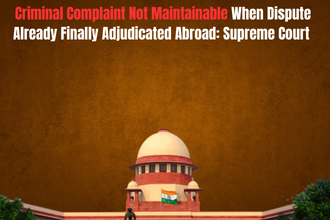The Supreme Court of India recently delivered a landmark judgment balancing fraud prevention, equity, and the future of students. In a case involving fraudulent caste claims, the apex court safeguarded the academic career of a meritorious medical student by regularising her MBBS degree, while at the same time penalising her father with a hefty fine of ₹5 lakhs for concealing past rejections of caste validity.
This decision, titled X vs The State of Maharashtra & Ors. [2025 LiveLaw (SC) 853], underscores the judiciary’s nuanced approach when fraud committed by a parent jeopardises the career of an innocent child. The bench, comprising Justices JB Pardiwala and KV Viswanathan, carefully weighed legal principles against equitable considerations before arriving at a middle ground.
Background of the Case
The student had secured admission to an MBBS course in 2016 on the strength of a caste certificate issued in 2009, which classified her as Mannervarlu (Scheduled Tribe). She successfully completed her MBBS in 2021 and is currently pursuing her postgraduate studies in the general category.
However, in 2022, after she had already completed her MBBS, the Caste Scrutiny Committee cancelled her certificate, relying on earlier findings. The committee noted that her father’s and uncle’s caste claims had been rejected as far back as 1989 and 1991, making the submission of the student’s certificate a continuation of fraudulent actions.
The Bombay High Court dismissed the student’s plea, branding the matter a “glaring example of patent fraud”. Facing the risk of losing her degree and career, she approached the Supreme Court.
Supreme Court’s Reasoning
At the outset, the Supreme Court upheld the High Court’s findings regarding fraud and misuse of caste certificates. However, the bench recognised that the student herself was not at fault and that cancelling her degree after completion would destroy her life and career.
Quoting the judgment:
“Here is a case where the appellant, a meritorious student otherwise, has completed her MBBS course and is now pursuing her PG Course. If we dismiss this appeal, that will be the end of her entire career.”
The Court highlighted that although equity must follow the law, in certain extraordinary circumstances, equitable relief may be necessary to prevent disproportionate hardship.
Relief Granted by the Supreme Court
The Supreme Court adopted a balanced approach:
- Regularisation of MBBS Degree
- The Court regularised her MBBS admission and degree, ensuring that her medical education and hard work would not go to waste.
- Permanent Bar on Caste Benefits
- The student and her family members provided an undertaking that they would never claim Scheduled Tribe status again in any capacity.
- She will not claim any benefits of the Mannervarlu Scheduled Tribe in the future.
- Penalty on the Father
- Recognising the father’s deliberate concealment and fraud, the Court imposed a ₹5 lakh cost, to be deposited in the National Defence Fund within two months.
- Confirmation of High Court’s Observations
- The Court clarified that apart from regularising the MBBS degree, all other findings of the High Court remain intact, thereby reinforcing the principle that fraud cannot be condoned.
Thus, while the student’s career was protected, the fraudulent actions of her father were penalised.
Key Legal Takeaways
- Fraud Cannot Be Rewarded, But Innocents Must Be Protected
- The Court reiterated that caste fraud is a serious offence. However, where the innocent child’s career is at stake, proportional relief may be granted.
- Undertakings Prevent Future Misuse
- By requiring the father to file an undertaking that no family member would seek caste benefits in the future, the Court ensured deterrence against future exploitation.
- Balance Between Law and Equity
- The judgment demonstrates the Supreme Court’s flexible interpretation in extraordinary situations. While fraud was not condoned, equity prevailed in favour of protecting the student’s academic journey.
- Responsibility of Parents
- The Court categorically held the father accountable, stating:
“One and all are responsible for this and we hold the father of the appellant more responsible for creating this imbroglio.”
Broader Implications of the Judgment
This case will likely influence future disputes involving:
- Caste certificate frauds in education and employment
- Balancing strict legality with equitable considerations
- Protection of students who complete courses in good faith
Importantly, the judgment sets a precedent for courts to regularise completed education in exceptional cases, provided safeguards are in place to prevent misuse.
Related Supreme Court Observations
The Court’s remarks are consistent with earlier rulings where completed degrees were protected in exceptional cases:
- In some past judgments, courts have allowed students to retain degrees obtained in good faith even when eligibility criteria were later found to be compromised.
- The focus has always been on ensuring that the career of a bona fide, meritorious student is not permanently destroyed due to parental or systemic lapses.
Conclusion
The Supreme Court’s decision in X vs The State of Maharashtra & Ors. reflects the judiciary’s effort to strike a delicate balance between legality, equity, and human impact. While the Court did not ignore the fraudulent actions of the father, it ensured that the student’s career and life were not irreversibly damaged.
By regularising the MBBS degree, imposing a ₹5 lakh penalty on the father, and prohibiting future caste-based benefits, the Court crafted a solution that upholds justice without compromising compassion.
This case sends a clear message: fraud will not go unpunished, but genuine merit will not be sacrificed at its altar.
Also Read
The Collegium System and the Demand for Transparency in Judicial Appointments


